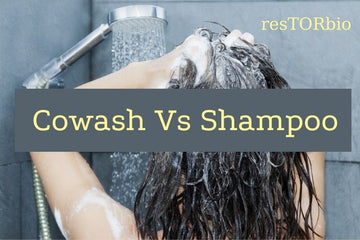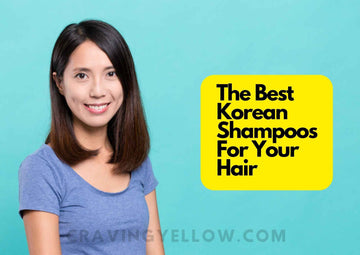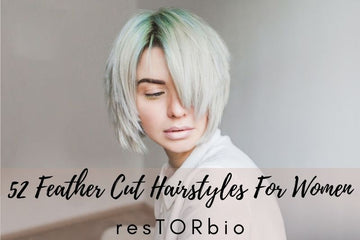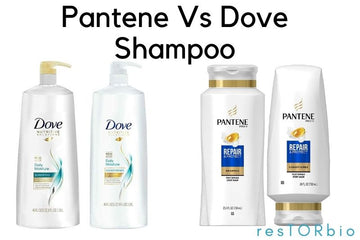
There is a lot of debate over whether cowash vs shampoo, is better for your hair. Some people say cowash is better because it doesn't strip your hair of its natural oils as shampooing can.
Others say that shampooing is better because it cleans your hair better. So, which is the best option for you? Let's explore more in this resTORbio article below.
What Is The Difference Between Shampoo And Co-Wash?
Both shampoos and co-washes work well for naturally curly hair. People love to mix and match shampoos and co-washes on different washing days. You shouldn't use just a co-wash for your cleansing process. Shampoo should be added now and again to prevent buildup.

What Is Co-Washing?
A co-wash (also known as conditioner shampoo) is a gentle hair wash that doesn't strip hair of its natural moisture. Co-washes do not contain sulfate and have mild cleansing ingredients. They remove product residue, dirt, oil, and some oils but not all.
Curly hair is drier than straight hair because the oils it produces from its scalp are less effective at traveling down the hair shaft.
These oils are essential for maintaining hair's lubrication and preventing dryness, breakage, and brittleness. These oils can be held at a healthy level by using a co-wash.
What Is Shampoo?
Hair products are traditional foaming shampoos that clean hair from dirt, product residue, oil, and other contaminants. Shampoos have more robust surfactant components that dissolve impurities that can't be removed by water alone.
The Role of Surfactants
There are four types: non-ionic, anionic, cationic, and amphoteric surfactants. Anionic surfactants, such as Sodium Laureth sulfate, are the strongest. They have a high pH which lifts away buildup and strips hair of its oils. This leaves the cuticle hydrated and lifted. This can cause dry hair, friction, protein loss, and frizz, mainly if curly hair is dehydrated naturally.
Anionic surfactants can be combined with non-ionic surfactants to make them milder. Sulfate-free shampoos are often made with mild anionic surfactants like Sodium Methyl Cocoyl Taurate and non-ionic surfactants like Lauryl Glucoside. Natural curly hair can benefit from products. They are gentle on natural hair and don't strip it.
How Well Do Co-Washes Clean Hair?
Many co-washes contain cationic or amphoteric surfactants. These detergents are milder than anionic surfactants. Behentrimonium chloride is a common co-washing surfactant. It acts as a hair conditioner and has a pH similar to hair's natural pH.
This helps keep the cuticle soft. Cationic surfactants have a positive charge to bind to the natural hair. Co-washes that contain only cationic surfactants won't effectively remove oils and dirt. A co-wash can remove some impurities if it contains amphoteric and cationic surfactants.
Although mild surfactants with low pH are still available, the pH of amphoteric surfactants is slightly higher than that of hair. Cocamidopropyl Betaine is a common amphoteric surfactant, which is derived from coconuts.
Curlsmith Curl Quenching Conditioner Wash contains both Cocamidopropyl Betaine and Behentrimonium chloride. This co-wash is gentle but effective.
How to Cleanse Your Hair with Sulfate-Free Shampoos
There are many formulas for these shampoos that provide different levels of cleansing. Low-poo shampoos are gentler while clarifying shampoos are more powerful and intense.
Low-poo Shampoos
Low-poo refers to low-lather shampoos. These products may contain non-ionic surfactants, and foaming agents such as Lauryl Glucoside. Because they are liquid-based, low-lathering shampoos can be an excellent option for co-washes for fine hair. They are lighter than cream-based co-washes because they have a liquid formula. Low-poo shampoos are gentle and non-stripping but still leave a little foam.
Curlsmith Vivid Tone Vibrancy Shampoo has a gentle, low-poo formula. Although it has the same look and feels as a traditional shampoo, it can be used frequently because it is non-stripping and moisturizing. It can be used on any curl type, thickness, or porosity.
Classic, Sulfate-free Shampoos
Depending on the formulation, sulfate-free shampoos that are not made with sulfate typically have a robust lather and a cleansing power. Surfactants include Sodium Methyl Cocoyl taurate, Cocamidopropyl Betaine, and Decyl Glucoside. All curl types can benefit from a classic, sulfate-free shampoo to avoid buildup.
It is Curlsmith's Core Strength. This shampoo is gentle enough to be used frequently but provides more foam than low-poo products. It contains protein ingredients that are particularly helpful for high porosity and damaged hair. However, it can be used by all hair types to achieve the proper moisture balance.
Shampoos for Clarifying
Shampoos containing sulfates strip hair and scalp of all product and sebum, but they do not remove any product or sebum buildup. There are many sulfate-free clarifying shampoos. These products often contain a mix of amphoteric and anionic surfactants. Clarifying shampoos are often the best for reaching the scalp and deep cleansing.
Curlsmith Wash & Scrub Detox Prio Biotic is a sulfate-free clarifying shampoo that contains micro-fine scrub particles. These particles gently exfoliate the hair and remove any buildup.
It is a lather-rich shampoo that also contains Apple Cider Vinegar. This vinegar is well-known for its clarifying properties. It can be used on all hair types, but it is beneficial for dry, flaky, or itchy scalp.
Cowash Vs Shampoo: When Should You Use It?
There are so many hair cleanser options. How do we decide how often to wash our hair? You can combine shampoo and a co-wash in your natural hair care routine by alternating washing each day.
Low-poos and co-washes can be used midweek when you need to restyle your hair quickly, or your scalp isn't too dirty. Co-washes can be a great option if you have to wash your hair often due to work or exercise.
To remove any oil or product residue, you can use classic sulfate-free shampoos 1-2 times per week. If you have product buildup or a flaky scalp, a clarifying shampoo should be used approximately every 4-5 washes.
How Often Should You Shampoo And Co-Wash?
It's up to each of you. Depending on how you use your hair, it may be helpful to co-wash your hair once or twice per week.
You can co-wash your hair once a week if you aren't sure where to begin. Then, shampoo your hair and use conditioner every other month.
You will be able to tell if your hair needs more or less shampooing sessions the more you know it.
If you don't have a suitable product, refer to our list of the best shampoo and conditioner to choose.
So, Which Is The Best Method For Curly Hair?
Every curl is unique, and there's no one-size-fits-all solution. Experimenting is the best way to discover what works for your rings. Keep at it for a while, and then see what happens. Alternate between shampooing and co-washing.
No matter what method you use, curly hair will be happier if it isn't washed as often. To avoid product buildup and maintain healthy oils, we recommend that you only wash your hair once per week. You can apply shampoo to the roots if they get greasy during the week.
FAQs
Is Co-wash Better Than Shampoo?
Jimmy Servera, a Hollywood hairdresser, says that co-washing leaves hair shinier and smoother than washing your hair with shampoo and conditioner.
Co-washing also has the added benefit of requiring one less product, which saves money and allows you to use less space in your bathroom.
What Do I Need To Shampoo If My Cowash Is Clean?
It's a cleanser, so use it just like a shampoo. It won't dry your hair out like a shampoo.
Is Co-washing A Cause of Hair Loss?
Hair loss is not caused by co-washing. It is more likely that your skin reacts to the ingredients in hair care products. Do not allow hair to build upon your scalp if you have experienced hair loss before co-washing.
What Is The Difference Between Conditioner and Co-wash?
What's the difference between conditioners and co-washes? A co-wash is a cream shampoo that doesn't contain any harmful chemicals that can cause frizz (sulfates or parabens). Conditioning refers to moisturizing, detangling, and strengthening hair.
Video
Conclusion
Cowash is a much more delicate process than shampooing and can leave your hair smelling good and looking healthy. If you have thick, oily hair and don't want to wash it every day, washing might be a good alternative.
It is the best option for normal to dry hair and everyday use. Although this process can strip your hair of its natural oils, it cleanses your hair thoroughly, preventing any build-up.
So, the best thing to do is try both cowash and shampooing and see which one works best for you.




